Right to Existence
Managing urgency
#stop
#exist
#resist
Stop the bleeding
Block human rights violations

“My dream for politics is that they will stop killing us, because if we die, we can’t fight. That’s it, that is my dream.”
Ivan, Belo Horizonte
Exist and resist
In 2018, the Brazilian constitution turns 30 and the Law that abolished slavery turns 130. After all this time, people living in the peripheries, favelas, ghettos and settlements still do not have their constitutional rights guaranteed by the state. Striking inequalities persist.
The right to life is a basic right guaranteed in Article 5 of the Federal Constitution. Nevertheless, even though it is provided for on paper, in practice it is not guaranteed, especially not in the peripheries. Initiatives that fight for the basic right to existence by resisting the constant rights violations in the peripheries produce political voices and bodies that build bridges for access to rights for the “marginalized” and forgotten members of the collective.
Planned State neglect
Due to unequal access to rights, the groups that have occupied the spaces of decision making and power have not historically included people from the periphery. The dominant groups plan for and prioritize non-peripheral territories and invest in public policies that do not reduce inequality. Seen through this lens, we cannot call this practice “state neglect.” Rather, we call it “planned state neglect.” Neglect is a choice made by those in power.
This planned neglect, upheld by economic powers and through the naturalization of segregation, contributes to the daily struggles of peripheral populations. The time that they might dedicate to politics they spend fighting to survive.
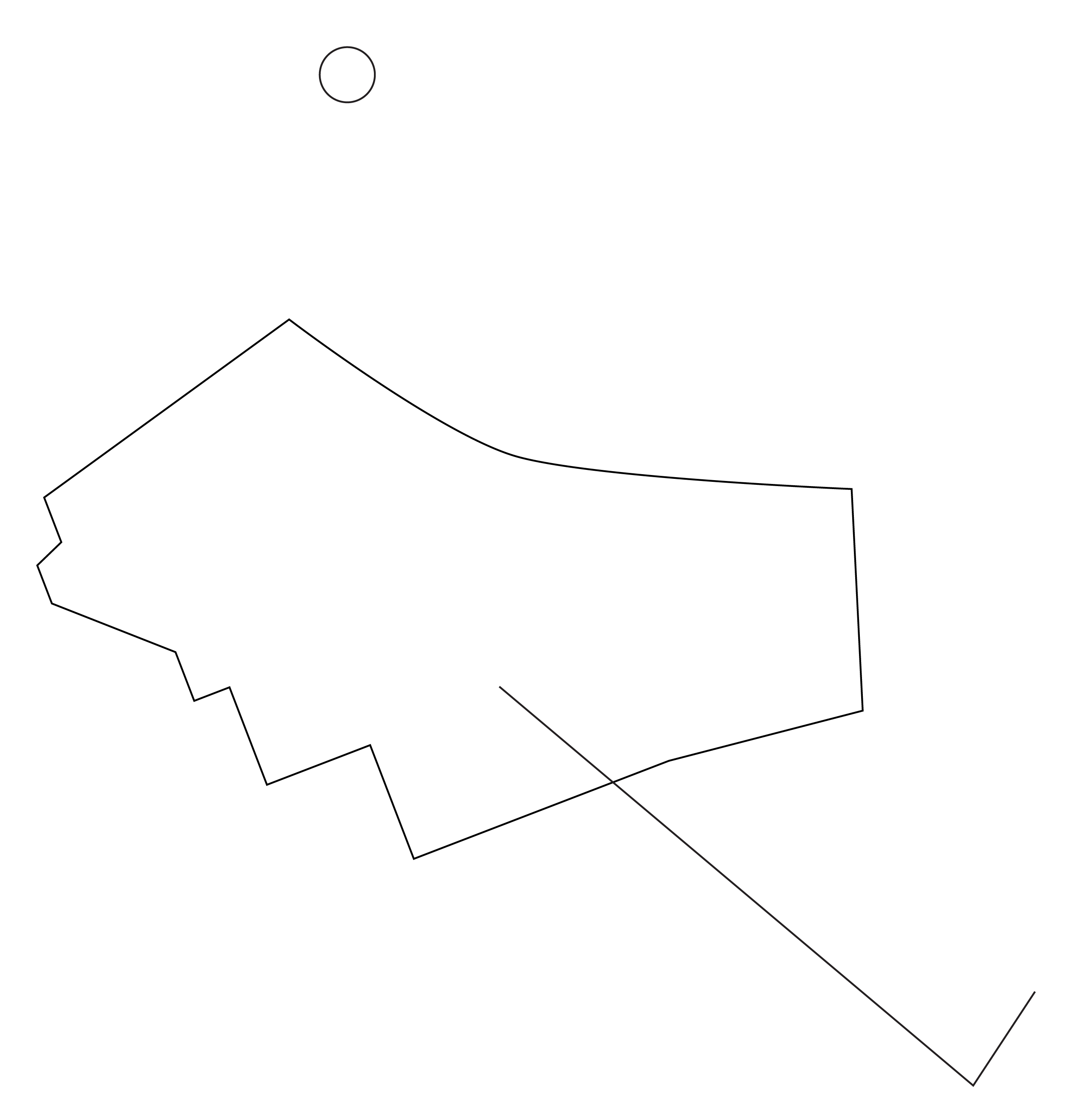
“A lot of the time, securing minimal survival conditions for a family means involving the family in the struggle, giving them access to political education. Because if you are overwhelmed with the demands of survival, you do not have time or conditions to think about anything else. And then people say ‘oh, Brazilians are alienated, they don’t get involved, they are omissive.’ Man, people are fighting to live, to survive, to put food on their tables, to pay their electric bills, to buy bread in the bakery, this is people’s reality. They are not organized in political parties and collectives, going to large protests in the streets. It is not because they are lazy or because they don’t care, much to the contrary.”
Fernanda, Belo Horizonte
A main focus for the doers that are working to mange urgencies in their territories is the consolidation of a shared identity for residents of settlements, favelas and ghettos. The strengthening of a collective political identity is a way to create confluence and propose an alternative dynamic in decision-making spaces. It substitutes the planned neglect of the state. The doers do not tolerate any more abuses, they denounce violations and give birth to this new existence.
“You can only make demands if you exist.
If you don’t exist, how can you pressure the state?”
Celinha, Belo Horizonte
Quilombo Manzo
Makota Kadoiale is one of the leaders of Quilombo Manzo, in Belo Horizonte. Founded in 1972, this resistance community of formerly enslaved people was only recognized as such in 2007, after much struggle by the community.
Humanity
To be, to become and to remain in the spaces of recognition and articulation.
The dispute in the collective imaginary for existence and the guarantee of rights runs through discussions and movements. The peripheries are in the fight not to be used as another research object but rather to occupy the intellectual and political space itself, as agents transforming realities. The historic invisibilization of these marginalized bodies makes this process more challenging. The doers make themselves present in the spaces, feeding the decision-making processes with necessary reflections that deepen the debates.
“It is enough to recognize that the largest trans issue is the bathroom, identity and respect for names. Names, bathrooms…the Supreme Court is going to determine which bathroom we can use? We are struggling over the concept of humanity.”
Duda, Belo Horizonte
Transvest
Transvest is a non-profit organization in Belo Horizonte that prepares travestis from the capital and surrounding region for the college entrance exam and gives elective courses, as well as aiding in the legal processes and psychological support for the population.
Invisible walls and the rush of time
The economic distribution within the urban territory has erected large invisible walls, dividing the accesses, state action, income, race, projects and dreams produced in the city. Existing requires ancestral strategies and social technologies that are created, adapted and applied day in and day out. Deaths in favelas, complexes and peripheries occur daily. Combatting and transforming this reality is one of the challenges for the continuity of projects and perspectives for the future.
Strategies for the production and diffusion of information that preserves existence have a timetable that is completely different than in other territories, with priorities that alternate and create a rush to block the violations that rip through plans and create an urgency for immediate actions.
Coletivo Papo Reto
Papo Reto Collective works in the Alemão Complex and in other Rio de Janeiro favelas with organizing, communication and mobilization to resist state violence and guarantee rights.
CCD na Web
CDD on Web is a community communication portal in City of God in the West Zone of Rio de Janeiro, which does politics by speaking to residents about public policies with the aim of transforming this reality.
In Brazil, according to Amnesty International, it is as if every two days an airplane carrying young people aged 15 to 29, of which 77% are black, falls from the sky. The majority of these youth who lose the right to life and to existence are from territories where political control is implemented through the use of police force.

“Here in Borel they implemented a curfew in two favelas with Pacifying Police Units (UPP), and a police officer entered the home of a youth and killed him with a shot in the back of the head. After that the officer reported that it he was resisting arrest, but he wasn’t resisting arrest, he was executed. And this was in 2013. In 2013 we organized our people, our friends. Occupy Alemão is like a protest, there is an open mic in the plaza where everyone went to speak out about what needed to change, and from there we wrote a manifesto and distributed it to raise awareness that we needed mediators between the police and the residents, and that the police couldn’t mediate conflicts with itself.”
Thamyra, Rio de Janeiro
State police force is a form of oppression that puts the weakest people on both sides of the front lines. In other words, both the police officer who oppresses and the person who suffers the violence come from the same context of a lack of fundamental rights. The state recruited the police officer that goes to the front lines in the peripheries. They are both on the same side. Existence and the right to life are connected through the urgent need to look again at state control in the peripheries and how state operations control, regulate and defend the population.

“Every 23 minutes a young black person is killed. How many are killed as a direct consequence of police action? And of these that are killed by police action, how many police were tried? And then am I going to try to put the police officer that is out there in the field, another black man, in jail? And what about the person that sent him? I have been saying’I don’t want the guy in the field, man, I want the boss, I want to get the one that is there hidden behind a table, in the air conditioning, giving orders and saying that he doesn’t have anything to do with it.”
Fernanda, Belo Horizonte
“The difference is that a lot of people who are debating new drug policies are from the middle and upper classes, they are involved and thinking about things that matter, too, like being able to use drugs without being persecuted, the right to the body, to freedom, to be able to use whatever substance you want. People are using drugs for health, which is very important, but remember that in the favelas even people who aren’t users die. So we have to talk about drug policy in the favela, because public policy for favelas is the war on drugs. The public security department delivers our main public policy, which is police presence in our neighborhoods. Under that policy users die, non-users die, people who are at church die, people who are at school die, everyone dies, assassinated by the idea of a war on drugs, and we have tried to have this debate, talk about this with our people.”
Jéssica, Rio de Janeiro
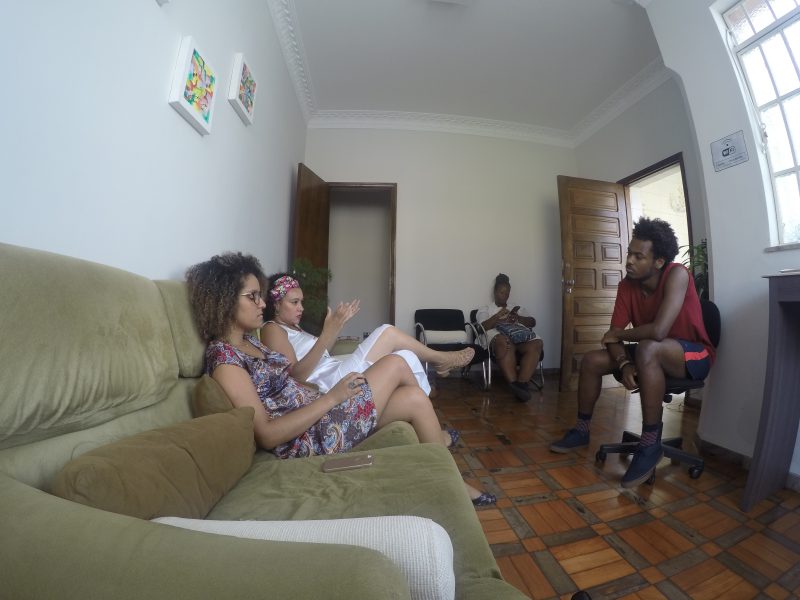
Ana Paula Freitas, Nana Oliveira, Vanessa Beco and Wellington Amorim
Maria Felipa Legal Aid
More than 720,000 people are incarcerated in Brazil. 40% of these people are awaiting trial and more than two thirds of them are black. On the other side of the equation, the Judiciary is a white and in large part male class that receives the highest salaries and benefit packages of all public employees. White women and men examining and trying black women and men.
Nana Vieira, Ana Paula and other lawyers perceived that the barrier of juridical language, a lack of access to private attorneys, excessive demands on Public Defender’s and the fact that human rights organizations mainly take on emblematic cases perpetuates a process of criminalization of the black and poor population that leaves gaps in their defense.
This led them to create Maria Felipa Legal Aid, which provides legal services for low prices. “Not having a lawyer to take their cases keeps people from speaking out, I can’t tell them to speak out unless I can assure that they won’t suffer retaliation,” they explain.
Fala Roça
Fala Roça is a print paper, a channel for communication about daily issues in Rio de Janeiro’s largest favela, Rocinha. Rocinha is located in the South Zone of the city and home to people of mainly Northeastern origin.
The person responsible for the paper is 24-year-old native of the community, Michel Silva. The son of general service assistants, Michel has been involved since he was young, often grabbing the paper that his dad brought home from work to keep up to date on the news. Reading the paper one day, he realized that the lifestyle of the people who live on the asphalt is very, very different from the people who live in the favela.
With a computer with 256MB of memory and an improvised credential reading “community press,” he began to cover what happened in his neighborhood and to be recognized for his work. From cultural events to the disappearance of the bricklayer Amarildo, Fala Roça is there. And in this election year, he maps out the candidates from favelas and hopes for the election of black youth who are aware of the state of political affairs in the country. “I am hopeful that we will have new candidates, unknown faces, and I think that the role of the media is to show who wants to change politics,” he said. “Transformation comes from people’s resignation.”
Visibility as as survival tool
Communication is a tool that brings visibility to rights violations happening in the peripheries.
Doers ensure that rights violations are recorded and that news about them is spread through engagement with the independent media in moments of urgency and collaboration to build non-linear and non-traditional support and action networks.
The groups and collectives that focus on this type of communication guarantee that information circulates to provide protection and allow for strategy adjustments.
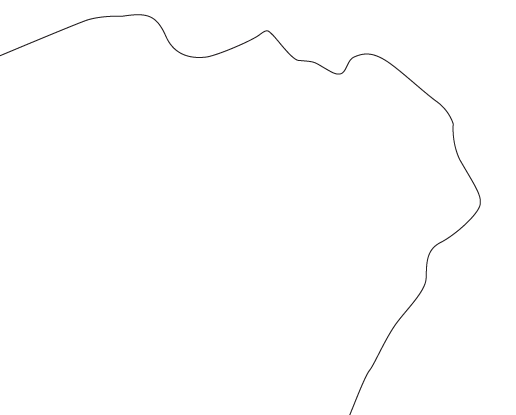
“And then they ask us: wow, the people here in the community are getting politicized, starting to understand public security, because they put it all on the page. Because they invite in the collectives. That is how it is, we have to think, we do have to occupy political spaces and fight for our basic rights. And technology helps a lot with this. So if we did not have technology we would be out of luck.”
Noemy, Rio de Janeiro
“People, this is the future, it is the good news that we have to take to all of our family members, to guide them and say: look, family, now we are citizens, after the passage of the 1988 Federal Constitution, we earned the same rights, to be considered citizens like any other Brazilians. So excuse me, brother, this is the new order.”
Fetxá, Brasília
Santuário dos Pajés
Santuário dos Pajés (Healer’s Sanctuary) is an indigenous territory of three large ethnicities that sits to the northwest of the city of Brasília. It is a territory that resists and fights against unbridled real estate speculation. Its leader, Fetaxá Verissimo, is a young man who inspires his community and us alike!
Casa Frida
Casa Frida (Frida’s House) is located in São Sebastião (a periphery of Brasília) and is much more than a cultural space, offering refuge to women who are victims of violence.
Forms of existing, resisting and co-existing in the peripheries include spreading knowledge and making it more accessible as well as building relationships with people in the territories and with those that influence from the outside.

“They think that we have, that native people have a lot of land, and ask why do we want more land? The person is like…and I always try to share my point of view and take a documentary, take an interview, I take different materials from the media with me, to show them, or even to show people here, and I say: people, this is where I was born, this is where my father died, my mom had me here, it was here that the tractor ran over me, dragging me for 100 meters with sand and everything. This is where they showed up, threatened my mom, threatened my dad, threatened us. It was here that everything happened, blood was spilled. It was here that my cousins gave their lives, many people gave their lives for this cause. So, if it were your house, if someone showed up at your house with a tractor and ran over it, what would you, how would you feel, how would you fight for that? How would you feel in my place, seeing that a tractor came and ran over a plant my father planted 45 years ago, running over it without respect, with no regard for it?”
Fetxá, Brasília
And a strong collective guarantees existence for threatened individuals.


“Truthfully, I was a cowardly person. I had to build a social project, equip the rooms, bring visibility to the project, invest in the project before coming out of the closet and sharing my identity. You know? Courageous are the girls who have been out there fighting with their identities from a young age, they are out in the streets, they paved the way so that I, at age 36, could start my gender transition.”
Duda, Belo Horizonte
Existence and collectivity
It is important to understand that the peripheries want to exist as they are, in connection with their roots and potential. Existing collectively is part of peripheral political action. This means genuinely maintaining indigenous, quilombola or black identity and all of these groups’ rites, rituals, traditions and respect for ancestry. Often, when the doer makes a choice to affirm this identity, they distance themselves from what is understood today as access to leisure and culture, especially entertainment culture.

“I missed out on some of my youth, you know? My childhood, too, because I have always been in this fight, not only in this one but for other indigenous lands, too (…) So sometimes I think gosh, I could let all this go, leave all this behind and have the life of a teenager, a social life, a different life. But then I think and what about in the future, if I leave now, how will it be, what causes will I fight for? My dad died for this, why would I leave it? My mom is threatened and goes through so much, why would I look at myself and say ‘I am going to let go of all of this to go to a party’? No, I think that wouldn’t be just to myself or to my ancestors or to my future offspring, the ones who are coming, my nephews, the grandchildren, everything.”
Fetxá, Brasília
“CCJ and all of us on the team are working more closely with urban youth and we have been in dialogue with rural youth for the last three years…We are also working with indigenous youth, making this connection with the people from the xucuru tribe, among others. And we are focusing on the question of the right to the city, right to mobility, from this perspective of youth that live in rural areas and in the city, how can we take this tool to the youth that are in the middle of the periphery.”
Jéssica, Recife
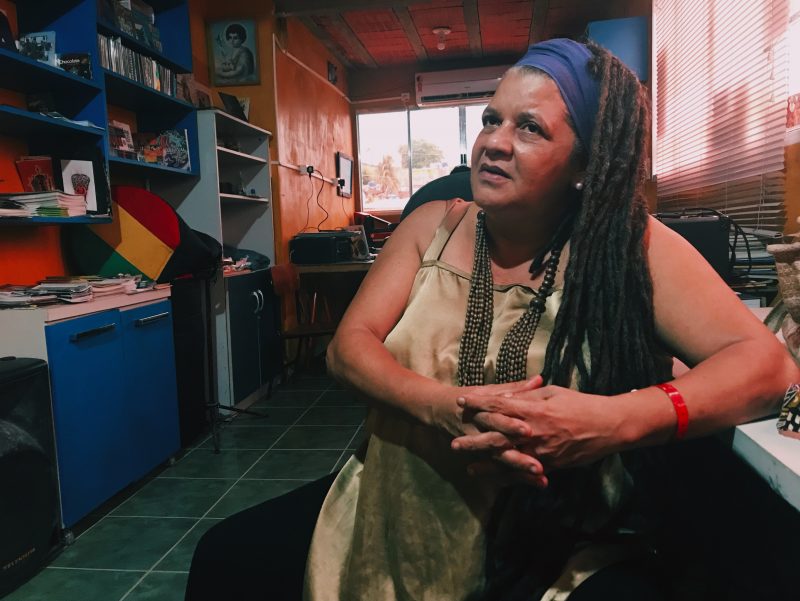
Mãe Beth de Oxum
Centro Cultural Coco de Umbigada
Mãe Beth de Oxum was born, raised and still lives in the Guadalupe neighborhood of Olinda. That is where she does politics.
Ialorixá priestess in a traditional Afro-Brazilian religious space called a terreiro, she has also hosted the Sambada de Coco dance in Guadalupe for the past 20 years. Because of this work, today she also coordinates the Coco de Umbigada Cultural Center. The Center is home to independent media actions, a recording studio, a community radio, a laboratory for independent technologies and citizen innovation and a restaurant.
“I am a woman, a mother with many children, some of which I had and others I didn’t, and I am on this front line here, with culture, with religion and with the perspective that we can transform our terreiro into a place that is more like us, blacker, more Afro-Brazilian, that looks like us and includes our perspective on the city,” she said.
In a state that kills 60,000 people per year — the majority of whom are black youth — Mãe Beth sees the most pressing challenge as passing public policies that meet the demands of the population. Because of this, in a context of violence, she wants culture to be the protagonist that can renew relationships and preserve symbols.
“It is here in the terreiro that everything happens, that the confrontations happen, rights violations, racism, violence. So it is here that we have to transform, before we can transform the country. We have to transform the place where we live.”
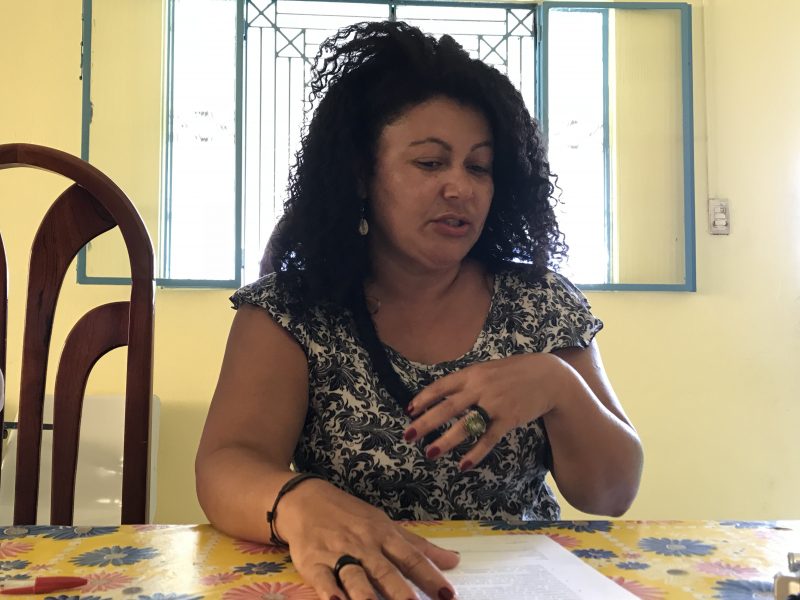
Elisângela Maranhão
Mães da Saudade
Elisângela grew up in Peixinhos, but never accessed the whole neighborhood when she was a child. That is because in this poor region of Recife, rival gangs disputed the territory and restricted the movement of residents. The dividing line was a road and you could not cross from one side to the other without authorization.
Violence is part of the population’s routine. Nearly 300 youth have been assassinated in the last three decades. Elisângela’s brother was almost one of them. In his time between prison sentences, he did not re-socialize well and eventually another group made an attempt on his life. He was able to escape death, left the state and started over far from his family.
Involved with social projects since she was twelve years old, Elisângela knew that she needed to do something. She started with people suffering because they had lost children to violence, creating Mães da Saudade (Mothers Missing Children) ten years ago. The group supports 60 mothers who have lost their sons to homicide. “We help mothers with legal questions, so that they can seek justice for the crime that took their children,” she explains. Beyond that, they host conversation circles, dialogues, and restorative circles that do emotional work to help mothers move through a trauma whose impacts extend far beyond the graveside.
And Elisângela knows that her work plays a role in making significant changes. “There is a serious problem with the denial of rights happening today. The lack of policies for prevention, which I think is a huge challenge. We have been talking about prevention since we started working. We are going through a moment of significant collapse because the politicians and legal representatives have no commitment to this,” she comments.
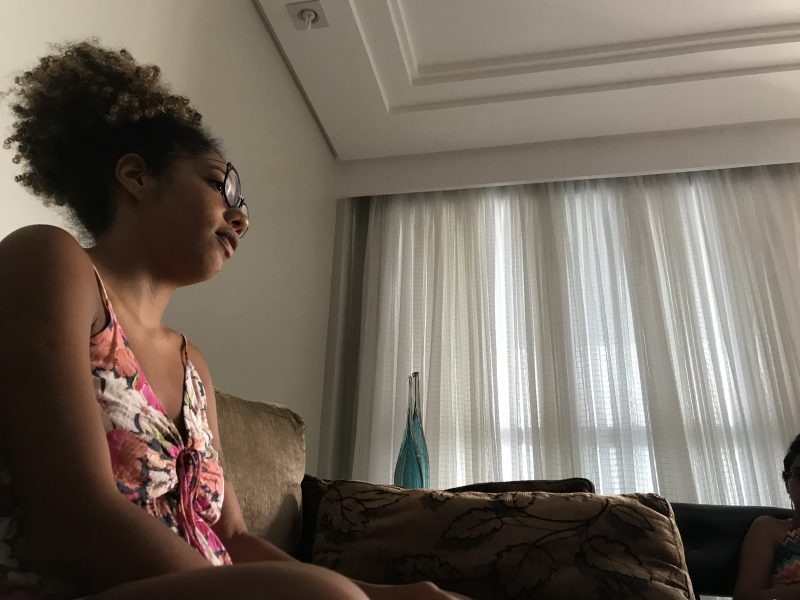
Bell Puã
Coletivo Afronte
How did you discover that you were a political being?
The Afronte Collective discusses ethno-racial questions in public schools and universities in Recife. One of the members is poet and history Master’s student Bell Puã, who grew up in an upper middle class black family. It was in the daily contradictions, in suffering racial discrimination from the stores she visited to the elevators she rode, that she discovered politics.

